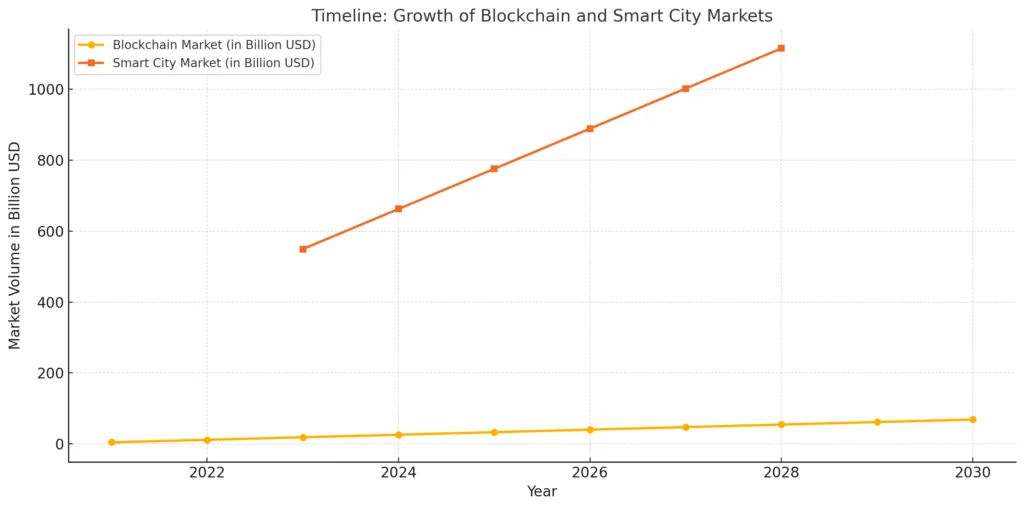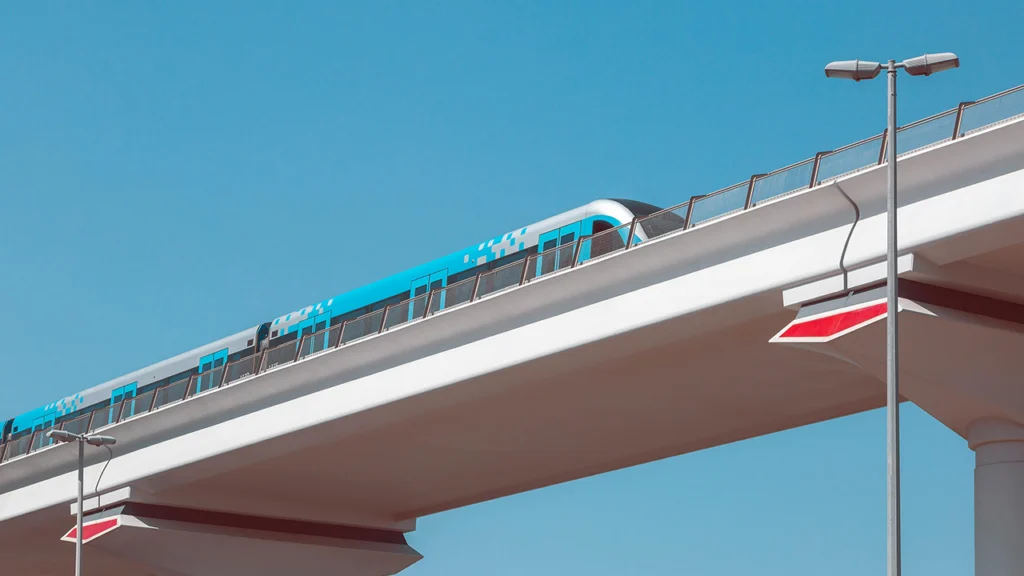In an unprecedented era of rapid urbanization, cities are under increasing pressure to become more efficient, resilient, and responsive to the needs of their citizens. As megacities expand and populations grow, traditional city management systems are struggling to keep pace. Enter digitalisation and blockchain - two transformative forces that are reshaping the way cities operate, communicate, and build trust. In this article, we explore how the convergence of blockchain technology and digitalization is making cities smarter, greener, and more trustworthy.
Understanding the Foundations: Digitalization and Blockchain
Digitalization refers to the integration of digital technologies into everyday urban operations. It involves using IoT (Internet of Things), AI, big data, and cloud computing to collect and analyze information in real-time. Digitalization enables smart traffic systems, predictive maintenance for infrastructure, digital public services, and citizen engagement platforms.
Blockchain, on the other hand, is a decentralized and tamper-proof digital ledger. It provides secure, transparent, and immutable record-keeping, which can be used for anything from financial transactions to identity management and supply chain tracking.
While digitalization enables data flow and automation, blockchain ensures the security, integrity, and traceability of that data. Together, they form a powerful toolkit for building smart cities.
Digitalization and blockchain: The technological backbone of modern cities
Digitisation refers to the ongoing integration of digital technologies into public services, infrastructure and governance. It encompasses everything from IoT networks and cloud computing to artificial intelligence and big data analytics. Through digitalisation, cities gain the ability to collect and process vast amounts of information in real time, enabling smarter decision-making, more agile public services, and more efficient infrastructure management. Blockchain, on the other hand, is a decentralised technology that enables secure, transparent and immutable record-keeping. It adds a critical layer of trust to digital ecosystems by ensuring that once information is recorded, it cannot be altered without consensus. Together, these technologies form a powerful foundation for reimagining urban environments - digitisation powers the systems and services, while blockchain secures and verifies their integrity.
Creating smarter cities through real-time data and trusted systems
When applied to urban contexts, digitalisation enables cities to become responsive ecosystems that adapt to dynamic needs. For example, transport networks can become more intelligent by analysing traffic patterns in real time and adjusting signals accordingly. At the same time, blockchain can improve systems such as ride-sharing, public transport ticketing or parking management by securing transactions, verifying identities and ensuring fair use without centralised control. In urban planning, data-driven tools can help simulate environmental impacts or infrastructure requirements, while blockchain can record every step of the planning process, from public consultation to zoning approval, creating a tamper-proof historical archive. In addition, cities that digitise public administration - from permitting to tax filing - benefit from faster, more transparent services, and blockchain ensures that citizens can trust the data and decisions behind those services.
Driving urban sustainability through digital innovation
Sustainability is no longer an option for cities - it is an imperative. Digitalisation plays a central role in enabling smarter energy consumption, reducing waste and conserving natural resources. Smart meters and sensors enable accurate monitoring of electricity and water usage, helping utilities and residents alike reduce consumption and costs. Blockchain complements these systems by facilitating decentralised energy markets, where individuals can sell excess solar power directly to their neighbours through secure, automated smart contracts. The same logic applies to waste management, where sensor-equipped bins can optimise collection routes and schedules, while blockchain creates a transparent and auditable system for tracking recyclable materials from origin to processing. Even water infrastructure can benefit, with leak detection, consumption tracking and maintenance records becoming part of an immutable digital ledger that holds all stakeholders accountable.

www.greenfriendlylabs.com
Restoring trust through transparency and digital empowerment
As more city functions are digitised, ensuring trust becomes increasingly important. Citizens need to believe that their data is secure, that public funds are being used properly, and that their participation in democratic processes matters. Blockchain has the potential to restore and strengthen this trust, providing verifiable digital identities that put individuals in control of their personal data. Unlike centralised databases that are prone to breaches and abuse, blockchain-based identity systems are decentralised and encrypted, allowing people to share only what they need and retain ownership of their data. In public administration, blockchain can bring radical transparency to procurement and budgeting processes by permanently recording bids, approvals and spending. In addition, blockchain-enabled voting systems - whether for local elections or participatory budgeting - can make civic engagement more secure and tamper-proof, empowering citizens to shape their urban environment with confidence.
Pioneering examples around the globe
Cities such as Dubai, Tallinn and Barcelona provide concrete examples of how blockchain and digitalisation can transform urban life. Dubai has committed to becoming the first blockchain-powered government, applying the technology in areas such as visa processing, land registration, and logistics. Estonia's capital, Tallinn, is a global leader in digital governance, using blockchain for secure identity verification, healthcare, and even e-residency programmes. Meanwhile, Barcelona is championing open data initiatives and digital citizen platforms that allow residents to participate directly in planning and governance, while maintaining control over their personal information. These cities demonstrate that with a clear vision and careful implementation, technology can support not only innovation, but also inclusion and sustainability.
Overcoming challenges on the path to smarter cities
Despite its potential, the integration of blockchain and digital technologies into urban systems is not without its obstacles. Data governance remains a critical issue, as cities must find ways to balance openness and privacy, especially in light of strict regulations such as GDPR. Interoperability between legacy infrastructure and modern systems is another technical hurdle, requiring thoughtful investment and long-term planning. There is also the social dimension: as more services are digitised, cities must ensure that no one is left behind by the digital divide. Inclusivity must remain a guiding principle, supported by accessible technologies and robust digital literacy. On a technical level, concerns about the scalability and environmental footprint of blockchain - especially older models such as proof-of-work - need to be addressed, ideally through more energy-efficient consensus mechanisms such as proof-of-stake or delegated proof-of-authority.
Using AI sustainably: Ecological aspects and CO₂ footprint comparison
Read More →Looking ahead: Designing the cities we want to live in
The convergence of blockchain and digitalisation is more than just a technological trend - it signals a shift in how we imagine the relationship between citizens, governments, and the systems that support everyday life. If implemented thoughtfully, these technologies can help create cities that are not only more efficient and resilient, but also more democratic, inclusive, and human-centred. The way forward requires collaboration between policymakers, technologists, urban planners and communities. It requires bold experimentation and ethical reflection. But above all, it offers a unique opportunity: to rebuild trust in public institutions, to rethink sustainability at a systems level, and to create urban environments that truly serve the needs of both people and the planet.
Wrap-up
In the quest to create cities that are not only smarter, but also more sustainable and equitable, the combination of blockchain and digitalisation stands out as a powerful enabler. These technologies offer more than just operational efficiency - they provide the infrastructure to build trust, promote transparency and ensure that urban development is aligned with environmental and social values. The smart cities of tomorrow will be defined not only by sensors and data, but also by the quality of interaction between governments and citizens, the integrity of digital systems, and the collective commitment to a more equitable and resilient future. By embracing these technologies thoughtfully and inclusively, we have the tools to reimagine urban life in ways that empower individuals, strengthen communities, and protect the planet for generations to come.
Literature
- The People-Centred Smart Cities Flagship Programme: https://unhabitat.org/programme/people-centred-smart-cities
- Recommendation of the Council on Blockchain and Other Distributed Ledger Technologies: https://one.oecd.org/document/C/MIN(2022)13/FINAL/en/pdf
- Smart Cities World: https://www.smartcitiesworld.net
- Smart City Development: A Decision-Maker’s Guide to Blockchain in Developing Countries: https://moderndiplomacy.eu/2024/05/06/smart-city-development-a-decision-makers-guide-to-blockchain-in-developing-countries/



